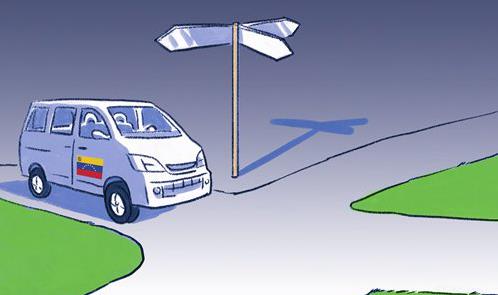
On January 23, the leader of opposition in Venezuela, Juan Guaidó, proclaimed himself interim president, quickly receiving support from the US. A peeved Venezuelan government cut diplomatic and political ties with US and ordered American diplomats to leave the country within 72 hours. However, the US State Department claimed that it is defying the order from the Maduro administration and their diplomatic personnel will stay in Venezuela.
Washington-Caracas ties have been souring for a long time. Since Hugo Chavez became president in 1999, Venezuela has been an eyesore for the US. In 2002, Venezuelan opposition staged an attempt to overthrow Chavez. However, to Washington's surprise, Chavez made a comeback with popular support in two days and the puppet government collapsed. Even then, the US did not stop targeting Caracas, constantly smearing the latter and imposing economic sanctions. Last February, then US secretary of State Rex Tillerson suggested that Venezuela may face a military coup, which would overthrow President Nicolas Maduro.
Venezuela re-elected the president last year. Before the election, the government and the opposition had several rounds of talks. But they did not reach an agreement on issues like the election date and inviting international observers to oversee the vote. Maduro was re-elected president with 67.8 percent of the vote. The US, EU and some Latin American countries alleged that the election was not fair and refused to recognize Maduro. Later, high-ranking US officials visited Latin American nations several times, lobbying to unite with Washington and isolate the Maduro administration. On September 25, 2018, US President Donald Trump even said at the UN general assembly that "It's a regime that, frankly, could be toppled very quickly by the military if the military decides to do that."
Under the leadership of Chavez and Maduro, Venezuela has been upholding sovereignty, countering US hegemony and exhorting Latin American countries to jointly follow the path of independence. The US cannot bear it. Washington will not allow any Latin American country that defies its hegemony to be stable.
Since 2015, Venezuela suffered an economic slowdown, social unrest, and government corruption. Left parties in Latin American states such as Argentina and Brazil lost elections, leading to right-wing groups coming to power. American hawks hope to overthrow the Maduro administration by ratcheting up pressure through influence brought by political changes in Argentina, Brazil and Colombia.
The US has been cracking down not only on Maduro's administration, but also on other Latin American left-wing governments. US National Security Adviser John Bolton branded Nicaragua, Venezuela and Cuba a "troika of tyranny," "stretching from Havana to Caracas to Managua" last year and predicted that the "troika" would "meet its demise."
In the past 20 years, left-wing parties in certain Latin American countries have been elected to office. They have deepened cooperation and unity for development, strengthened regional integration, sought diversified diplomacy and built equitable partnerships on the international stage. The establishment of Union of South American Nations and Community of Latin American and Caribbean States has shown that Latin America can take care of its own problems.
Anxious about being marginalized in Latin America, the Barack Obama administration tweaked its Latin American policy to create a rift in the alliance of left-wing nations. Certain goodwill measures like normalizing ties with Cuba were taken. Then US secretary of State John Kerry even declared that "the era of the Monroe Doctrine is over" in November 2013. Monroe Doctrine was the core of the US' Latin American policy. Washington has regarded the Americas, including Latin America, as its own geopolitical sphere, and prevented other countries from spreading their influence on the continents.
After Trump took office, neoconservative hawks have led the Latin American policy and intended to reuse the "Monroe Doctrine." They have intervened in Latin American affairs without hesitating to throw the norms of international relations to the winds. It is foreseeable that future US-Latin America relations and ties within Latin America will enter a troubled period.
The crux of Venezuela's ongoing political instability and insecurity lies in the choice of development path, which could only be decided by its own people.
To solve the problem, various Venezuelan political forces should embrace dialogue, and strive for coordinated economic and social development while safeguarding national stability and peace. The international community should respect Venezuela's sovereignty and right to self-determination, oppose interference in its internal affairs, and be wary of the "Monroe Doctrine" once again sowing seeds of disaster in Latin America.
—————————————————————
FOCUS ON CONTEMPORARY NEEDS.
Should you have any questions, please contact us at public@taiheglobal.org